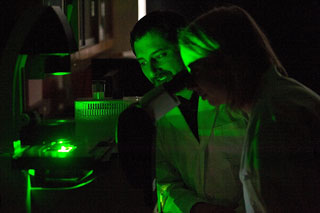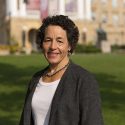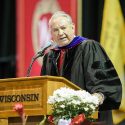Program merges dual interests in science and policy
Melding of mind and policy matters is all in a day’s work for the graduate students in the Neuroscience and Public Policy program at the University of Wisconsin–Madison.

On Feb. 1, 2011, Lindsay Pascal, a graduate researcher in the Neuroscience and Public Policy Program, works in the lab of Brian Baldo, an assistant professor of psychiatry, at University Research Park. Pascal’s dissertation research focuses on the brain’s role in regulating eating behavior.
Photo: Bryce Richter
The program, the only one in the country, offers students the chance to explore the intersection of science and society while working toward graduate degrees in both neuroscience and public affairs. The goal, according to program director Ronald Kalil, is to train a cadre of scientists well versed in the realms of both scientific research and policy, able to inform conversations in both areas.
“I was aware that there were lots of scientists — neuroscientists even more than others — who really wanted to do something to influence policy but they didn’t know how to go about it,” says Kalil, a professor of neuroscience.
The Neuroscience and Public Policy program is a partnership between the Neuroscience Training Program in the UW–Madison Graduate School and the La Follette School of Public Affairs.
Since 2005 the double-degree program has led to a Ph.D. in neuroscience and a Master of Public Affairs (M.P.A) degree, with an emphasis on science and technology policy. A second track, newly approved this year, will couple the Ph.D. with a Master of International Public Affairs (M.I.P.A) degree.
At first mention, the two fields may sound disparate. But neuroscience, as the study of the brain and nervous system, holds a unique position with regard to policy implications, Kalil says.

Lindsay Pascal (right), graduate researcher in the Neuroscience and Public Policy Program, views a slide showing coronal rat brain slices through a fluorescence microscope with Brian Baldo (left), an assistant professor of psychiatry, at University Research Park.
Photo: Bryce Richter
“Our brain defines who we are,” he says. “In so many areas impacting human life, policy and law are predicated upon notions of how we function behaviorally as humans — notions which may be in need of revision.” He cites childhood education, prosecution of juvenile criminals, health care, and the notion of personal responsibility underpinning the legal system as a few examples.
“We’re interested in thinking about how social science connects to hard science, and increasingly that connection is about how the brain works and the policy implications that arise from that,” says Donald Moynihan, the associate director of LaFollette. “In a class discussion about how people make decisions, having someone who can comment on the workings of the brain enriches that discussion with people who approach it with interests in social science.”
The program’s benefits extend beyond the enrolled students, says physiology professor Tom Yin, chair of the Neuroscience Training Program. “The presence of N&PP on campus has made all faculty and students aware of the implications of basic neuroscience discoveries on public policy. The public debate on use of stem cells is just one example of why it is imperative to have informed opinions on both the scientific and the policy side,” he says.
Students in both domestic and international tracks undertake a heavy load of coursework in neurobiology, policy analysis, economics, and government to work toward the two degrees simultaneously — a challenging task, but one Kalil considers a crucial aspect of the program’s structure.
“They get an integrated experience that allows them to be thinking all the time about how these two areas interact,” he says.
All students also complete a mandatory internship during their third summer to gain hands-on experience working at a foundation, government agency, or institution involved in science policy.
Fourth-year student Lindsay Pascal interned last summer with the Scientific Freedom, Responsibility, and Law program of the American Association for the Advancement of Science in Washington, D.C., compiling research findings and writing policy articles on topics including synthetic biology and the role of genetics in psychiatric illness. Patric Hernandez, another fourth-year student, worked in the Government Accountability Office on the transparency of government stimulus spending.
“One of the main things I came away with was a better understanding of how bureaucratic organizations work and how they impact how policy is presented and analyzed to guide decisions,” says Hernandez of his experience.
Pascal and Hernandez, the initial cohort in the Neuroscience and Public Policy program, received their M.P.A. degrees last May and are now continuing their dissertation research in neuroscience — Hernandez on functional brain imaging and Pascal on the brain’s role in regulating eating behavior.
“This was the only program I found anywhere in the country that allowed me to explore my policy interests without sacrificing a basic research track,” says Pascal. “It’s definitely made me think more about what my work means as a place in the world instead of just what it means in my little scientific niche of feeding behavior.”
After finishing their doctorates, both students plan to pursue careers that will draw upon their policy experiences, possibly in science administration, management, research policy development, or curriculum design.
“There are a lot of hot issues in neuroscience that relate well to policy — stem cells, functional neuroimaging, lie detection, free will versus determinism,” Hernandez says. “Neuroscience is something that fascinates people. We’re studying the brain, we’re studying what we are [as people]. It’s in the public interest to know how the brain works.”


